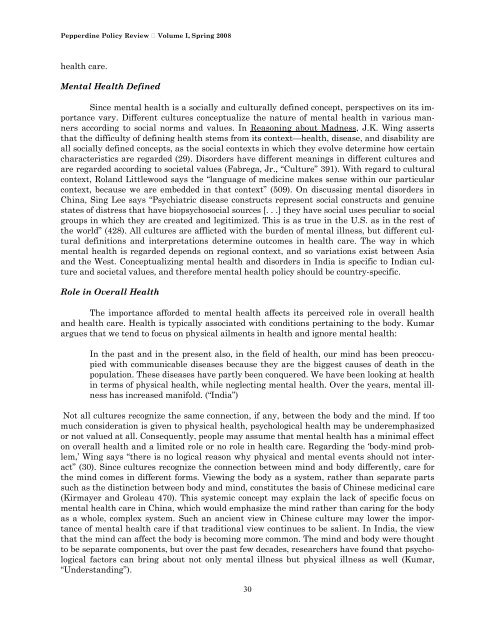Pepperdine University School of Public Policy
Pepperdine University School of Public Policy
Pepperdine University School of Public Policy
Create successful ePaper yourself
Turn your PDF publications into a flip-book with our unique Google optimized e-Paper software.
<strong>Pepperdine</strong> <strong>Policy</strong> Review Volume I, Spring 2008<br />
health care.<br />
Mental Health Defined<br />
Since mental health is a socially and culturally defined concept, perspectives on its importance<br />
vary. Different cultures conceptualize the nature <strong>of</strong> mental health in various manners<br />
according to social norms and values. In Reasoning about Madness, J.K. Wing asserts<br />
that the difficulty <strong>of</strong> defining health stems from its context—health, disease, and disability are<br />
all socially defined concepts, as the social contexts in which they evolve determine how certain<br />
characteristics are regarded (29). Disorders have different meanings in different cultures and<br />
are regarded according to societal values (Fabrega, Jr., “Culture” 391). With regard to cultural<br />
context, Roland Littlewood says the “language <strong>of</strong> medicine makes sense within our particular<br />
context, because we are embedded in that context” (509). On discussing mental disorders in<br />
China, Sing Lee says “Psychiatric disease constructs represent social constructs and genuine<br />
states <strong>of</strong> distress that have biopsychosocial sources [. . .] they have social uses peculiar to social<br />
groups in which they are created and legitimized. This is as true in the U.S. as in the rest <strong>of</strong><br />
the world” (428). All cultures are afflicted with the burden <strong>of</strong> mental illness, but different cultural<br />
definitions and interpretations determine outcomes in health care. The way in which<br />
mental health is regarded depends on regional context, and so variations exist between Asia<br />
and the West. Conceptualizing mental health and disorders in India is specific to Indian culture<br />
and societal values, and therefore mental health policy should be country-specific.<br />
Role in Overall Health<br />
The importance afforded to mental health affects its perceived role in overall health<br />
and health care. Health is typically associated with conditions pertaining to the body. Kumar<br />
argues that we tend to focus on physical ailments in health and ignore mental health:<br />
In the past and in the present also, in the field <strong>of</strong> health, our mind has been preoccupied<br />
with communicable diseases because they are the biggest causes <strong>of</strong> death in the<br />
population. These diseases have partly been conquered. We have been looking at health<br />
in terms <strong>of</strong> physical health, while neglecting mental health. Over the years, mental illness<br />
has increased manifold. (“India”)<br />
Not all cultures recognize the same connection, if any, between the body and the mind. If too<br />
much consideration is given to physical health, psychological health may be underemphasized<br />
or not valued at all. Consequently, people may assume that mental health has a minimal effect<br />
on overall health and a limited role or no role in health care. Regarding the ‘body-mind problem,’<br />
Wing says “there is no logical reason why physical and mental events should not interact”<br />
(30). Since cultures recognize the connection between mind and body differently, care for<br />
the mind comes in different forms. Viewing the body as a system, rather than separate parts<br />
such as the distinction between body and mind, constitutes the basis <strong>of</strong> Chinese medicinal care<br />
(Kirmayer and Groleau 470). This systemic concept may explain the lack <strong>of</strong> specific focus on<br />
mental health care in China, which would emphasize the mind rather than caring for the body<br />
as a whole, complex system. Such an ancient view in Chinese culture may lower the importance<br />
<strong>of</strong> mental health care if that traditional view continues to be salient. In India, the view<br />
that the mind can affect the body is becoming more common. The mind and body were thought<br />
to be separate components, but over the past few decades, researchers have found that psychological<br />
factors can bring about not only mental illness but physical illness as well (Kumar,<br />
“Understanding”).<br />
30












